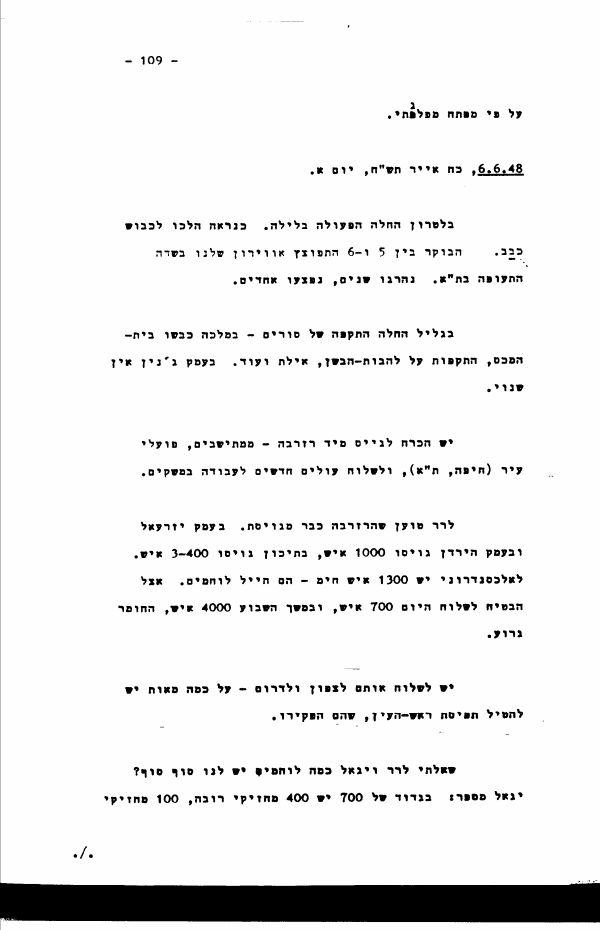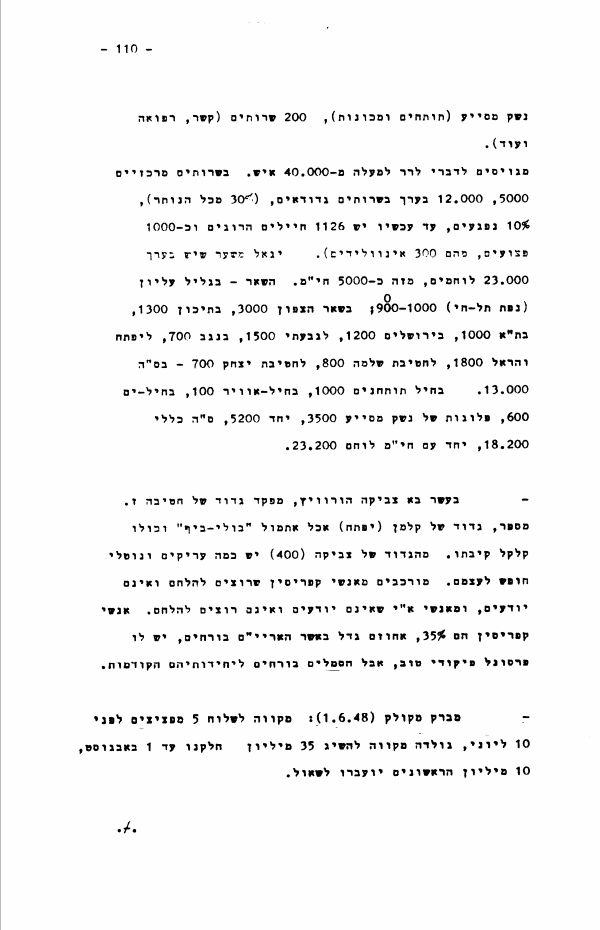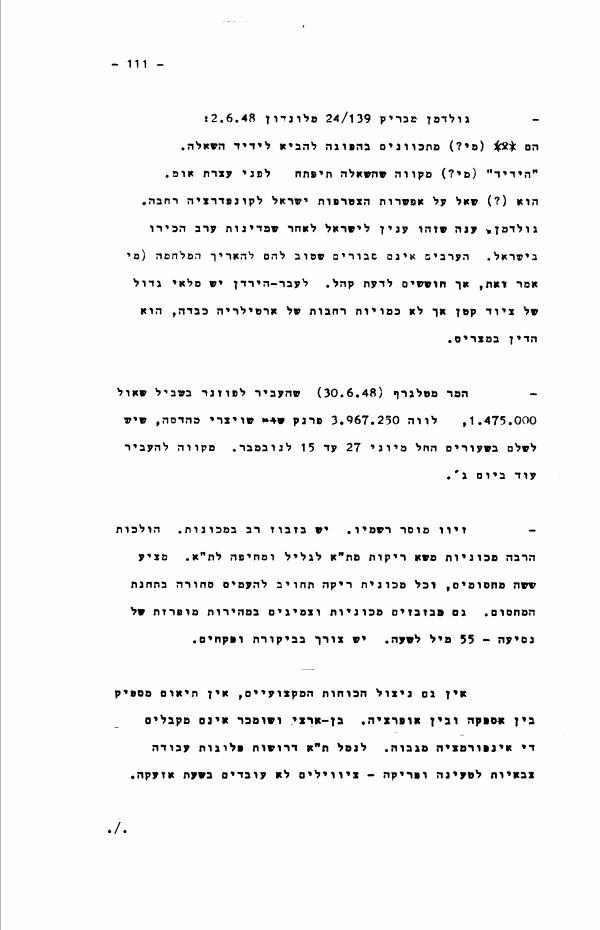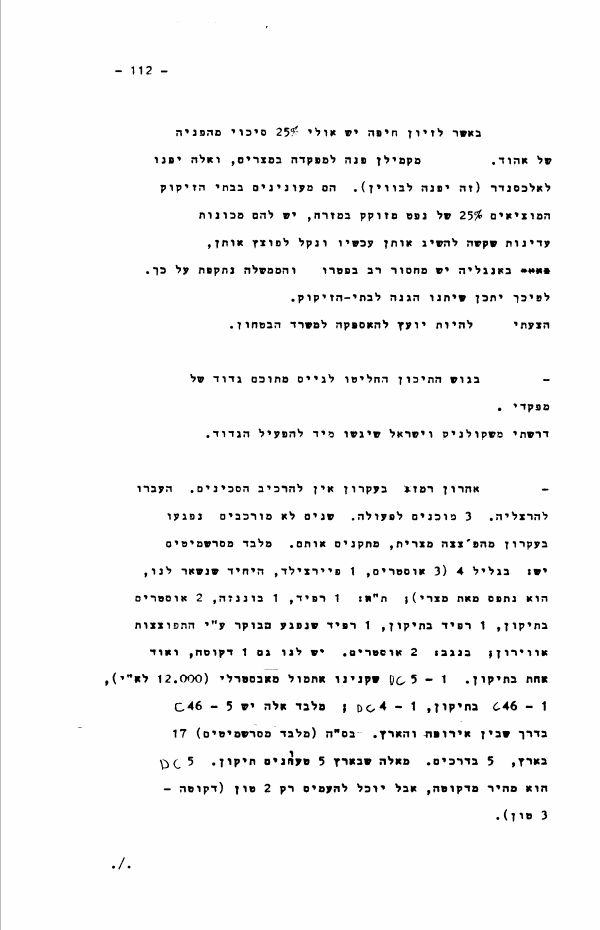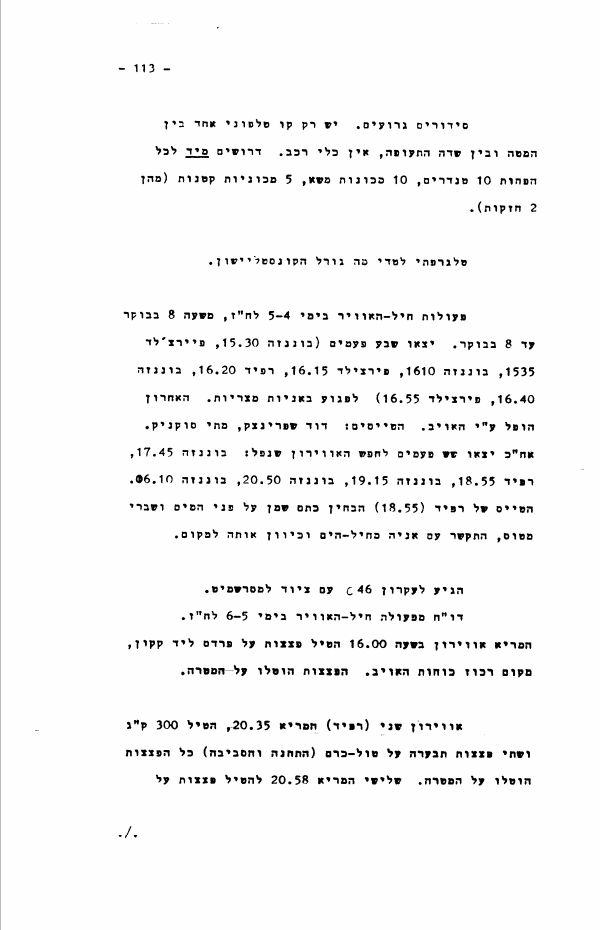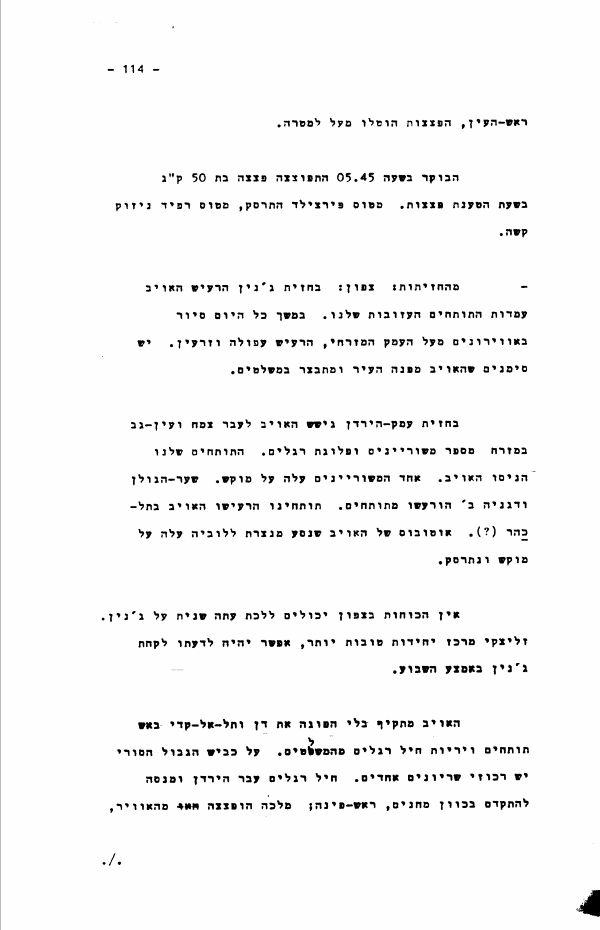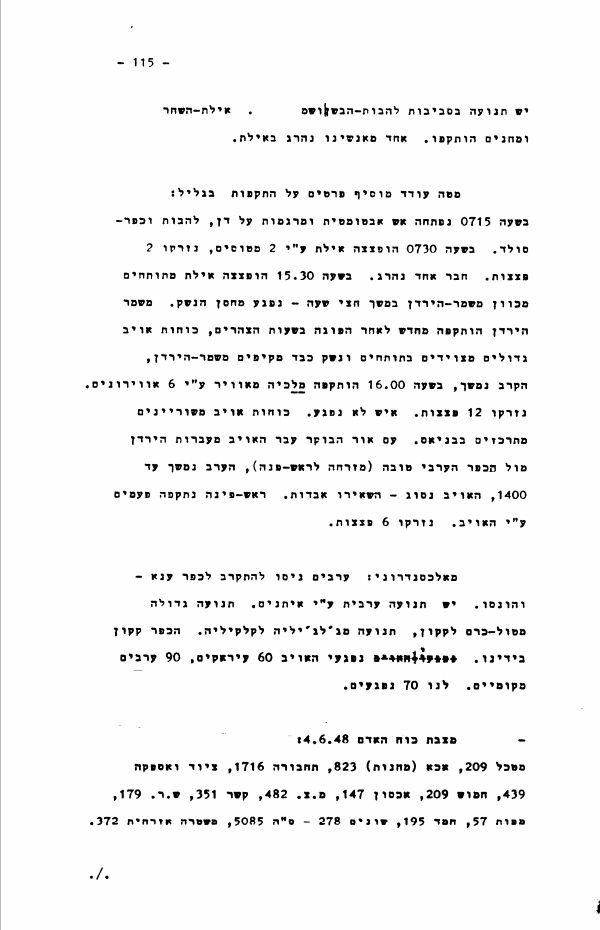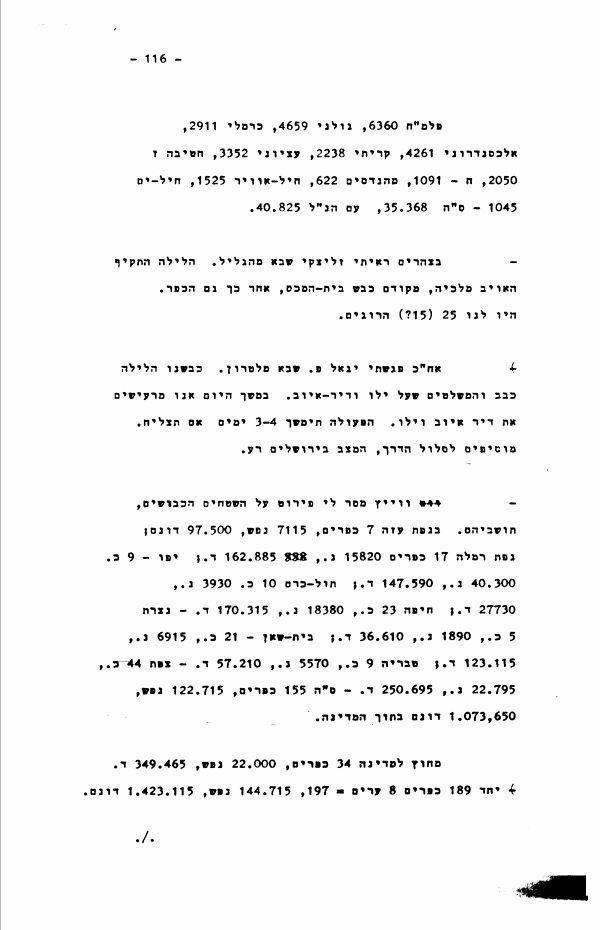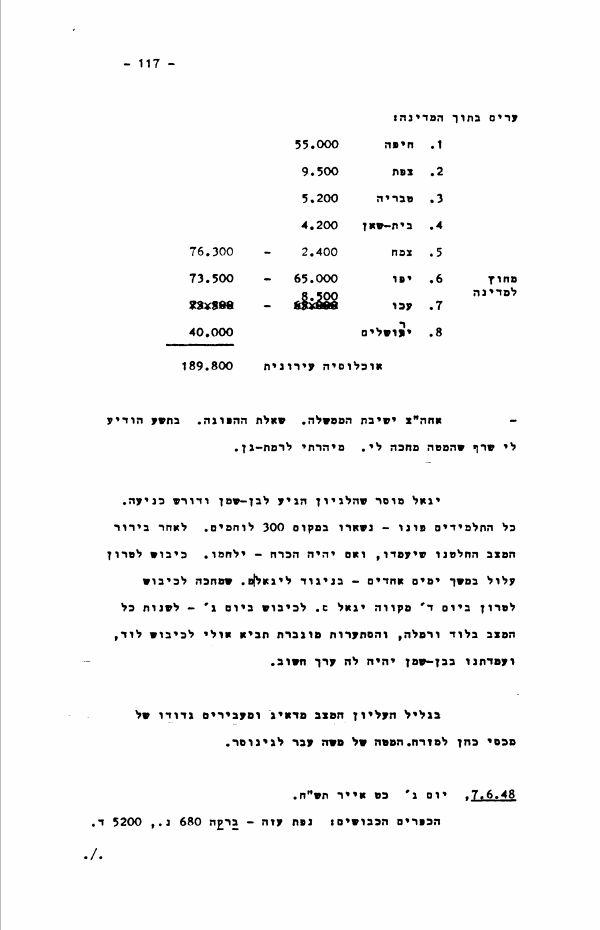Sunday, June 6, 1948
The operation in Latrun began tonight. They apparently went to conquer Al-Qubab [in preparation for a third attack on Latrun - Operation Yoram]. This morning between 5 and 6, one of our planes in the Tel Aviv airfield exploded. There were two fatalities and several injuries.
In the Galilee, Syrians [actually the Arab Liberation Army] launched an attack - in Malkiyya they conquered [captured] the Customs House [while also crossing the Jordan and attacking Mishmar HaYarden]. [There were] attacks against Lahavot HaBashan, Ayelet [HaShahar] and elsewhere. No change in Jenin Valley.
There's an immediate need to recruit a reserve - from among settlers, workers in cities (Haifa, Tel Aviv) - and to send new immigrants to work on the settlements.
Lehrer [M. Zadok] claims that the reserve has already been recruited. 1,000 men were recruited in the Jezreel Valley and Jordan Valley. 300-400 men were recruited in the center. Alexandroni has 1,000 garrison men - they're a fighting force.
The IZL promised to send 700 men [to enlist] today, and 4,000 men over the course of the week. The material [personnel] is terrible. They need to be sent to the north and the south - a few hundred should be tasked with capturing Rosh Ha'Ayin, which they abandoned.
I asked Lehrer and Yigael [Yadin] how many fighters we ultimately have. Yigael reports: in a battalion of 700, there are 400 with rifles. 100 with auxiliary weapons (cannons [mortars] and [heavy] machine [gun]s). 200 [in support] services (signal, medical, etc.).
According to Lehrer, more than 40,000 men have been recruited. 5,000 in the main services. About 12,000 in battalion services (30% of all fighters). 10% casualties (so far 1,126 soldiers have been killed and 1,000 wounded, including 300 invalids).
Yigael estimates that there are about 23,000 fighters, including a garrison force of about 5,000. In the Upper Galilee (Tel Hai Subdistrict) there are 900-1,000, in the rest of the north[ern front] 3,000. In the center 1,300; in Tel Aviv 1,000. In Jerusalem 1,200. Givati has 1,500, in the Negev 700, Yiftah and Harel have 1,800, Shlomo's brigade [the 7th Brigade] has 800. Yitzhak [Sadeh]'s brigade [the 8th Brigade] has 700 - in total, 13,000.
In the artillery corps 1,000, in the air force 100, in the navy 600, auxiliary weapons companies 3,500. Altogether, 5,200. Overall total, 18,200; along with the garrison force, [there are] 23,200 fighters.
At ten came Zvika Hurwitz[-Gilat], battalion commander of Brigade Zayin [the 7th Brigade]. Yesterday a battalion under [Moshe] Kelman (Yiftah [Brigade, 3rd Battalion]) ate "bully beef" [preserved minced beef, of the sort supplied to the British army], and they all got food poisoning. Zvika's battalion (400) has a few deserters and men who gave themselves a release. [The battalion's troops] comprise men from Cyprus who want to fight and don't know how, and Eretz-Israel people who know how and don't want to fight. The Cyprus men constitute 35%, and their proportion is increasing as Eretz-Israel people run off. He has good command personnel, but the sergeants are running off to the previous units.
- Cable from Kollek (June 1, 1948): Hope to send 5 bombers before June 10. Golda hopes to get 35 million, our portion [from the fundraising] by August 1. The first 10 million will be transferred to Shaul [Avigur, for procurement purposes].
- [Nahum] Goldmann cables 24/139 from London, June 2, 1948: They (who?) [The British] intend to resolve the [Eretz-Israel] question during the truce. "The friend" (who?) [Hector McNeil, British Foreign Office Minister of State] hopes that the question will be opened [raised for discussion] before the UN General Assembly. He (?) [McNeil] asked about the possibility of Israel joining a broad confederation. Goldmann replied that this is a matter for Israel, after the Arab states have recognized Israel - the Arabs are not convinced that prolonging the war will benefit them (who said this?), but they're concerned about public opinion. Transjordan has a large supply of small equipment [arms], but not extensive quantities of heavy artillery. The same holds for Egypt.
Hammer [of the United Jewish Appeal in New York] telegraphs (June 30, 1948) that he transferred 1,475,000 to Pozner [representative of the Jewish Agency Finance Department in Europe] for Shaul [Avigur], borrowed 3,967,250 Swiss francs from Hadassah, which has to be repaid in installments from June 27 until November 15. He hopes to transfer more on Tuesday.
- [Marcus] Sieff shares his impressions. There's a lot of waste involving vehicles. Many empty trucks are going from Tel Aviv to the Galilee and from Haifa to Tel Aviv. He proposes having six roadblocks, and requiring every empty vehicle to be loaded up with supplies at the roadblock station. Vehicles and tires are also being wasted by speeding - 55 miles [about 90 km] per hour. There's a need for oversight and inspectors.
Professional manpower also isn't being exploited. The coordination between logistics and operations is inadequate. [Ephraim] Ben-Artzi and [Max] Schumacher [from the Logistics Department] are not getting enough information from above. The Tel Aviv port needs military work companies for loading and unloading - civilians don't work during [air-raid] alarms.
As to the [anti-aircraft] arming of Haifa, there's maybe a 25% chance for the request submitted to Youer [presumably Sir Hugh Dow]. [General] MacMillan approached the headquarters in Egypt, and they'll approach Alexander [former British commander in the Mediterranean and future defense minister] (who will approach Bevin). They're interested in the refineries, which produce 25% of the refined petroleum in the East. They have fragile machines that are difficult to acquire these days and easily explode. There's a severe petrol [gasoline] shortage in England, for which the government is coming under attack. So it's possible that they'll provide defense for the refineries.
I proposed [to Sieff] that he become logistics advisor in the Defense Ministry.
- In the central bloc they decided to recruit a battalion and commanders from among themselves. I instructed Shkolnik [Eshkol] and Yisrael to get to work immediately operationalizing the battalion.
- Aharon Remez: The "Knives" [Messerschmitts] cannot be assembled at Ekron [Tel Nof]. [They were] transferred to Herzliya. 3 are ready for action. Two, unassembled, were damaged by the Egyptian bombardment at Ekron. They're being repaired. Aside from the Messerschmitts there are: In the Galilee 4 (3 Austers, 1 Fairchild - the only remaining one, captured from Egypt); Tel Aviv: 1 Rapid, 1 Bonanza, 2 Austers under repair, 1 Rapid under repair, 1 Rapid that was damaged this morning by an exploding airplane; in the Negev: 2 Austers. We also have 1 Dakota, and another one under repair. 1 DC-5 we bought yesterday from an Australian (P£ 12,000), 1 C-46 under repair, 1 DC-4; aside from these we have 5 C-46 en route from Europe to Israel. In all (aside from the Messerschmitts), 17 in Israel, 5 en route. Of those in Israel, 5 need repair. DC-5 is faster than Dakota, but can only carry 2 tons (Dakota - 3 tons).
Arrangements for the air force are terrible. There's only one telephone line between the Staff and the airfield. There are no vehicles. They urgently need at least 10 pickups, 10 trucks, 5 small vehicles (2 of them strong).
I telegraphed Teddy: What's happening with the Constellation.
Air force activities on the 4th-5th of the month, from 8 a.m. [June 4] to 8 a.m. [June 5], they set out seven times (Bonanza - 1530, Fairchild - 1535, Bonanza - 1610, Fairchild - 1615, Rapid - 1620, Bonanza - 1640, Fairchild 1655) to strike Egyptian ships. The last one was brought down by the enemy. The pilots [aircrew] [were] David Sprintzak, Mati Sukenik. Afterwards they set out six times to search for the downed plane: Bonanza - 1745, Rapid - 1855, Bonanza - 1915, Bonanza - 2050, Bonanza - 0610. The Rapid's pilot (1855) noticed an oil spill on the water and broken plane parts. He contacted a naval vessel and directed it to the place.
A C-46 arrived at Ekron [Tel Nof] with equipment for a Messerschmitt.
Report on air force activity for the 5th-6th of the month:
A plane took off at 1600 hours, dropped bombs over an orchard near Qaqun, a place where enemy forces concentrate. The bombs were dropped on the target.
A second plane (a Rapid) took off at 2035. Dropped 300 kg and two incendiary bombs on Tulkarm (the [railway] station and surroundings), all the bombs were dropped on the target. A third took off at 2058 to drop bombs on Rosh Ha'Ayin. The bombs were dropped over the target.
This morning at 0545 a 50 kg bomb exploded while bombs were being loaded. A Fairchild was blown up, a Rapid was severely damaged.
From the fronts: North: On the Jenin front the enemy shelled our abandoned cannon positions. Throughout the day they flew over the eastern valley, shelled Afula and Zar'in. There are signs that the enemy is evacuating the city [Jenin] and fortifying itself in strongholds.
On the Jordan Valley front the enemy scouted the area in the direction of Tsemah and ''Ein Gev using a number of armored vehicles and an infantry company. Our cannons drove the enemy away. One of the armored vehicles struck a landmine. Sha'ar HaGolan and Degania Bet were shelled by cannons. Our cannons shelled the enemy at Tel Qasr (?) [ today - Tel Katzir]. An enemy bus traveling from Nazareth to Lubiyye hit a landmine and blew up.
Right now the forces in the north can't make a second attempt against Jenin. Zelicki [M. Carmel] is assembling fresher units. In his view it will be possible to take Jenin midweek.
The enemy is attacking Dan and Tel al-Qadi nonstop with cannon fire and infantry gunfire from the strongholds [primarily - from Tel Azaziat]. A few armored vehicles are concentrated on the Syrian border road. [Syrian] infantry [troops] have crossed the Jordan and are trying to advance in the direction of Mahanayim, Rosh Pinna. Malkiyya was bombed from the air. There's movement around Lehavot HaBashan and Shamir. Ayelet HaShahar and Mahanayim were attacked. One of our men was killed in Ayelet [HaShahar].
Oded [the new 9th Brigade, in the eastern Upper Galilee] staff provides further details about the attacks in the Galilee. At [05]0715 Dan, Lehavot [HaBashan], and Kefar Szold came under automatic gunfire and mortar fire. At 0730 Ayelet [HaShahar] was bombed by two planes, two bombs were dropped. One [kibbutz] member was killed. At 1530 Ayelet came under cannon fire from the direction of Mishmar HaYarden for half an hour - a weapons depot was damaged. Mishmar HaYarden was attacked again after a lull around noon. Large enemy forces equipped with cannons and heavy weapons are encircling Mishmar HaYarden. The fighting continues. At 1600 Malkiyya was attacked from the air by 6 planes. 12 bombs were dropped. No one was hurt. Enemy forces are concentrating in Banyas. At sunrise the enemy passed over the Jordan crossings opposite the Arab village of Tuba (east of Rosh Pinna) [near Kefar HaNasi]. The fighting continued until 1400. The enemy retreated. Left casualties behind. Rosh Pinna was attacked twice by the enemy and 6 bombs were fired.
From Alexandroni: Arabs tried to get [from Yehudiyya, today - Yehud] close to Kafr ''Ana [around Or Yehuda, east of Tel HaShomer] - and were driven away.
There's Arab movement near Eitanim north of Tira. A lot of movement from Tulkarm to Qaqun. Movement from Jaljulia to Kalkilya. The village of Qaqun is in our hands. Enemy casualties [comprise] 60 Iraqis, 90 local Arabs. We have 70 casualties.
The manpower situation, June 4, 1948: General Staff 209, Personnel Department (camps) 823, transport 1,716, equipment and supplies 439, armaments 209, storage 147, Military Police 42, signal 351, M. S. [medical service] 179, Science Corps 195, miscellaneous 278 - total 5,085, civilian police 372. Palmach 6,360, Golani 4,659, Carmeli 2,911, Alexandroni 4,261, Kiriati 2,238, Etsiyyoni 3,352, Brigade Zayin [7th Brigade] 2,050, Het [8th Brigade] - 1,091, engineers 622, air force 1,525, navy 1,045 - total 35,368, with the above 40,825.
Around noon I saw Zelicki [M. Carmel], who came from the Galilee. During the night the enemy attacked Malkiyya; earlier they conquered the Customs House, then the village as well. We had 25 (?), 15 killed.
In the afternoon I met Yigal P. [Allon], who came from Latrun. During the night we conquered Al-Qubab and the strongholds above Yalu and Deir Ayyub [on the ridges east of the Ayalon mountain range]. During the day we're shelling Deir Ayyub and Yalu. The operation will last 3-4 days if successful. We're continuing to pave the road [the Beaumont Road to Jerusalem]. The situation in Jerusalem is bad.
- [Yosef] Weitz gave me an account of the occupied territories, their inhabitants and size. In the Gaza Subdistrict 7 villages, 7,115 persons, 97,500 dunam; Ramle Subdistrict 17 villages, 15,820 p., 162,885 d.; Jaffa - 9 v., 40,300 p., 147,590 d., Tulkarm 10 v., 3,930 p., 27,730 d.; Haifa 23 v., 18,380 p., 170,315 d.; Nazareth 5 v., 1,890 p., 36,310 d., Bet She'an - 21 v., 6,915 p., 123,115 d.; Tiberias 9 v., 5,570 p., 57,210 d.; Safed 44 v. 22,795 p., 250,695 d. - In total, 155 villages, 122,715 persons, 1,073,650 dunam within the state. Outside the state 34 villages, 22,000 persons, 349,465 dunam. Altogether, 189 villages [and] 8 cities - 197; 144,715 persons; 1,423,115 dunam.
[For the sake of comparison, Ben-Gurion listed the estimated Arab population size in cities before the outbreak of war.]
Arabs [in cities] in the state [within the UN borders]:
1
Haifa
55,000
2
Safed
9,500
3
Tiberias
5,200
4
Bet She'an
4,200
5
Tsemah
2,400
76,300………………………………………………..
Outside the state
6
Jaffa
65,000
7
Acre
8,500
73,500……………………………………………….
8
Jerusalem
40,000………………………….
Total urban population
189,800
- Government meeting in the afternoon. The question of a truce. At nine [Ze'ev] Sherf informed me that the Staff was waiting for me. I rushed to Ramat Gan.
Yigael [Yadin] reports that the Legion reached Ben-Shemen and is demanding [that we] surrender. All the schoolchildren were evacuated - 300 fighters remain. After clarifying the situation, we decided that they would stay. And if necessary - fight.
The conquest of Latrun might take a few days. Unlike Yigal P. [Allon], who's waiting for Latrun to be conquered on Wednesday [June 9], Yigael S. [Yadin] is hoping that it will be conquered on Tuesday, [which could] change the situation in Lod and Ramle. A more intense attack could perhaps lead to the conquest of Lod, and our position in Ben-Shemen will be very important.
The situation in the Upper Galilee is troubling and [we're] shifting Maxie Kahan's battalion eastward. Moshe [Carmel]'s headquarters was moved to Ginossar.





